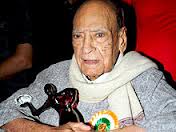
Mumbai, August 27: In 1998, when German playwright Bertolt Brecht’s birth centenary ceremony was organised by 14 progressive cultural groups and numerous other left, secular individuals in Mumbai, veteran actor and activist AK Hangal inaugurated the programme.
Hangal placed Brecht as an example for artists to fight against fascist powers that encroach on people’s freedom.
“It is Brecht’s work against the fascists in Europe that encourages artists to stand against such forces,” he had said, in the programme which was held in Bhupesh Gupta Bhavan, Prabhadevi.
Hangal was the member of the Communist Party of India (CPI) and his association remained till his last breath on August 26.
“Apart from being active in the party’s cultural wing, he had keen interest in other activities as well. His comradely nature and belief in progressive values remained intact till the end,” said AB Bardhan, former general secretary, CPI.
Hangal worked as a tailor in Karachi and came in contact with the Communist movement there. He moved to Mumbai after partition, where he came in contact with other veteran actors like Balraj Sahni and the Indian People’s Theatre Association (IPTA).
It was his secular and progressive ideology for which he suffered a boycott from the entire film industry for two years, after his encounter with Sena chief Bal Thackeray over accepting an honour given by the government of Pakistan. Hangal told Thackeray that he did not need a certificate of patriotism from anyone to prove his love for India. Fearing that casting him will draw the Sena chief’s ire, he was not signed on for any film for two years.
“He was the last of that league of actors, who thought of art as a tool for social change,” said Subodh More, one of the organisers of the programme on Brecht. Prakash Reddy of CPI remembered Hangal as a party member who even at the age of 95 would discuss the party’s activities with the enthusiasm of a youngster.
CM Prithviraj Chavan offered his condolence to Hangal, and said he was a person who never lost faith from secularism and Marxism.
Datta Iswalkar, leader, the mill workers’ union, said, “Hangal walked with us in a number of rallies. He believed that the worker is the real tool of revolution.”






Comments
Add new comment